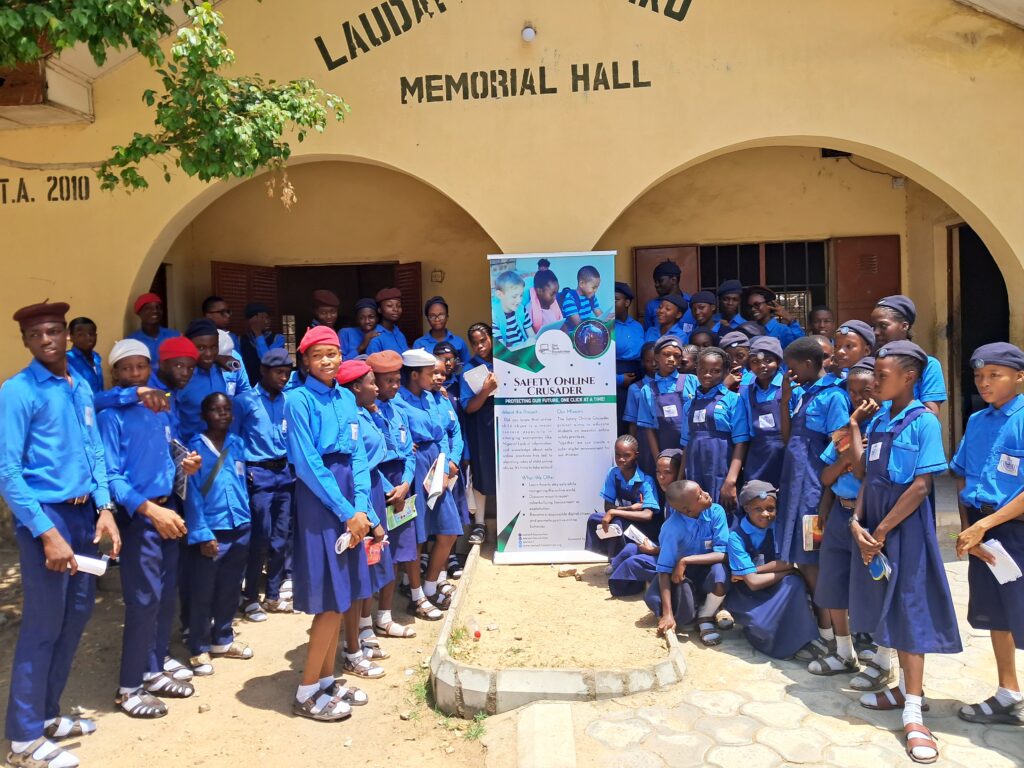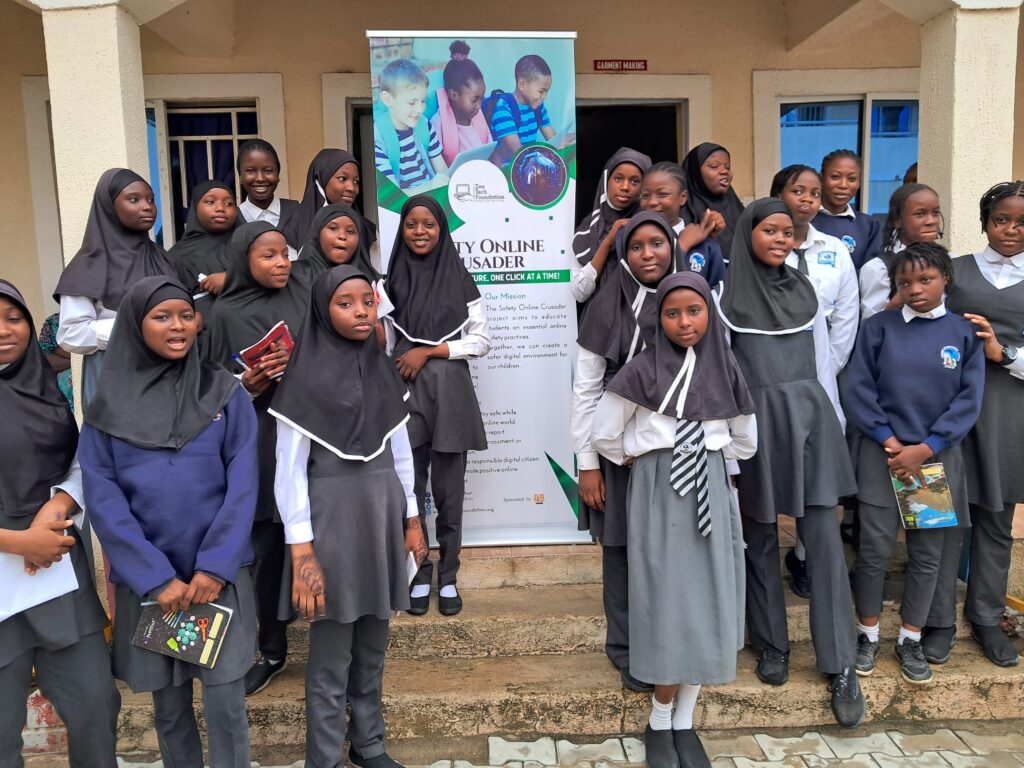Empowering Nigerian youth through education on online safely
Being aware of how secure yourself online is important to navigate the internet safely. Zee Tech Foundation have created a training program to help Nigerian youth with their online safety.


The challenge of online child abuse
In recent years, the statistics surrounding online child abuse is alarming and has raised concerns worldwide, with Nigeria being one of the countries facing significant challenges in this regard. As emerging economies like Nigeria experience a surge in unstructured and mobile internet usage the risks of online child abuse have become higher. The United Nations Children’s Fund (UNICEF) reports that Nigeria has one of the highest rates of online child abuse in Africa, with approximately 70% of Nigerian children at risk of online sexual exploitation. Many reasons account for this figure which may include mobile internet penetration, level of education and economic empowerment.
Recognizing the urgent need for intervention, this project together with Zee Tech Foundation seeks to bridge the gap by educating a minimum of 1500 students from secondary schools across Northern Nigeria on ways to stay safe online, report incidents of cyberbullying, harassment or exploitation, and foster responsible digital citizenship. The program will equip these students with age-appropriate information sources and materials, teach them how to become online safety Ambassadors and Peer Advocates within their communities, and guide them in the safe use of the internet.
Photo credit: Zee Tech Foundation
Project location
The focus area for this project is two states in Nigeria, Bauchi and Plateau States. These states have been chosen as pilots for this programme primarily for ease of accessibility and maximal use of available funding. In addition, the current insecurities that the nation has grappled with has greatly limited access to physical education facilities making children rely more on mobile internet without supervision, for education and entertainment.
The aim of Safety Online Crusader
The primary goal of this program is to equip young individuals with the necessary tools and knowledge to ensure a safe experience on the internet. Through this initiative, the participants will receive comprehensive training in the following areas. Firstly, they will learn essential skills and knowledge that enable them to recognize and avoid online threats, safeguarding themselves and their peers from potential harm. Secondly, they will gain a deep understanding of different forms of online abuse, including cyber bullying, grooming, and exploitation.
They will also develop insights into the potential consequences of engaging in online misconduct and recognize the detrimental impact it can have on their mental health and overall well-being. Finally, the beneficiaries will be educated on the significance of reporting instances of online abuse of misconduct, along with understanding the appropriate channels to do so. Through these lessons, the program aims to empower youths and enable them to navigate the digital landscape safely and responsibly.
Photo credit: Zee Tech Foundation
Expanding the benefits to the wider community
1. Spreading awareness: Project beneficiaries become advocates for online safety by sharing their knowledge and resource materials with family, friends, and community members.
2. Supporting vulnerable individuals: Armed with their knowledge of online safety, these students can assist vulnerable individuals in their community, such as older adults, people with disabilities and those with limited technology experience.
3. Engaging in peer mentoring: Students who were trained during the project will serve as peer mentors within their schools. They will create programs or clubs where they mentor younger students, helping them understand and navigate the online world safely. This peer-to-peer approach encourages a positive and inclusive digital culture.
4. Collaborating with local organizations: Students can collaborate with local organizations focused on digital literacy, cyberbullying prevention, or online safety initiatives by volunteering their time, sharing their expertise and contributing to online safety awareness campaigns aimed at empowering the wider community.
5. Promoting positive online behavior: Armed with their understanding of responsible digital citizenship, students can promote positive online behavior within their community. They can actively participate in online discussions, lead by example through respectful and inclusive interactions, and discourage cyberbullying or online harassment.
6. Collaborating with schools and policymakers: Students can engage with school administrators, teachers, and policymakers to advocate for the integration of online safety education into the curriculum.
Photo credit: Zee Tech Foundation
Elevating awareness, knowledge, and classroom cyber safety
The young people will gain awareness of the risks related to cyberspace and how to avoid them. They will learn about the presence of predators and child groomers and of the effect of negatively using the internet because information shared rarely disappears. They will also be aware of the benefits and information depth of the internet
The project aims to equip the students with essential knowledge and skills related to online safety. They will learn key concepts such as setting smart and strong passwords. Additionally, they will also learn how to recognize and avoid scams and insecure links. Understanding privacy settings on social media platforms will help them maintain control over their personal information and online presence. The use of reporting and blocking features on their phones and social media platforms will help them take appropriate action against online threats. Students will develop critical thinking skills to evaluate the credibility of online information and sources.
Through the program, the aim is that students will develop a positive attitude towards technology. Students will understand that technology can be a powerful tool when used responsibly and safely. They will gain confidence in utilizing digital tools for learning, communication, and research purposes, and the students will be encouraged to explore innovative ways to use technology for educational and personal growth, while also being mindful of potential risks.
The project will contribute to an enhanced classroom environment, with a focus on online safety. A safer online environment will be fostered within the classroom, promoting a sense of security and trust among students. Increased awareness and knowledge of online safety will lead to more responsible online behavior, reducing instances of cyberbullying, harassment, and other negative online interactions. Students will be more engaged in discussions and activities related to digital citizenship and online safety, creating a positive and inclusive classroom culture.

Photo credit: Zee Tech Foundation
Find regular project updates here!